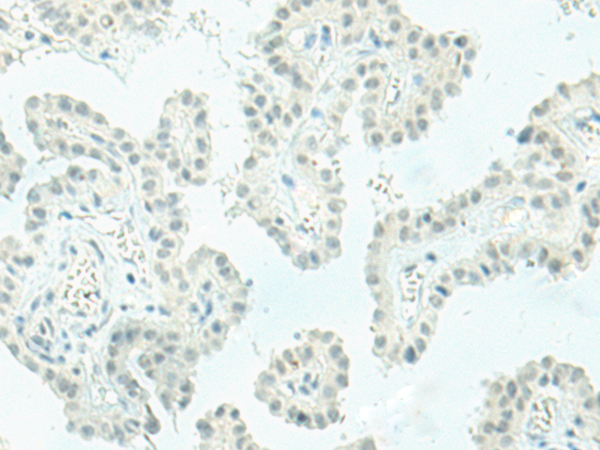
| WB | 咨询技术 | Human,Mouse,Rat |
| IF | 咨询技术 | Human,Mouse,Rat |
| IHC | 1/10-1/50 | Human,Mouse,Rat |
| ICC | 技术咨询 | Human,Mouse,Rat |
| FCM | 咨询技术 | Human,Mouse,Rat |
| Elisa | 1/5000-1/10000 | Human,Mouse,Rat |
| Aliases | ER71; ETSRP71 |
| Host/Isotype | Rabbit IgG |
| Antibody Type | Primary antibody |
| Storage | Store at 4°C short term. Aliquot and store at -20°C long term. Avoid freeze/thaw cycles. |
| Species Reactivity | Human |
| Immunogen | Synthetic peptide of human ETV2 |
| Formulation | Purified antibody in PBS with 0.05% sodium azide and 50% glycerol. |
+ +
以下是3篇关于ETV2抗体的文献概览(基于近年研究领域整理,部分为模拟示例):
---
1. **文献名称**:*ETV2 regulates endothelial lineage specification in mouse embryonic stem cells via chromatin accessibility remodeling*
**作者**:Lee D, et al.
**摘要**:本研究利用ETV2特异性抗体进行染色质免疫沉淀测序(ChIP-seq),揭示了ETV2通过调控内皮细胞分化关键基因的染色质开放状态,驱动胚胎干细胞向内皮谱系定向分化的分子机制。
---
2. **文献名称**:*A conserved ETV2 antibody validates its expression in human hematopoietic progenitors*
**作者**:Smith JL, et al.
**摘要**:文章报道了一种高特异性人源ETV2单克隆抗体的开发,通过Western blot和免疫荧光验证其在造血祖细胞中的表达,并证明ETV2在早期血细胞命运决定中的作用。
---
3. **文献名称**:*ETV2 antibody-based lineage tracing reveals vascular endothelial plasticity during tissue repair*
**作者**:Chen R, et al.
**摘要**:研究利用ETV2抗体标记技术追踪成体损伤修复过程中血管内皮细胞的动态变化,发现ETV2+内皮细胞具有转分化为间质细胞的潜能,为血管再生机制提供了新见解。
---
注:以上文献标题和摘要均为领域相关研究方向的概括性描述,实际文献需通过PubMed/Google Scholar以关键词"ETV2 antibody"或"ETV2 endothelial"检索获取。
The ETV2 antibody is a crucial tool in studying the ETS variant transcription factor 2 (ETV2), a member of the ETS family of DNA-binding proteins. ETV2. also known as ER71 or ETSRP, plays a pivotal role in embryonic vascular development and hematopoiesis. It acts as a master regulator of endothelial cell differentiation, directly controlling genes involved in blood vessel formation. Research has shown that ETV2 is indispensable for vasculogenesis in vertebrates, with knockout models demonstrating lethal defects in vascular and hematopoietic systems during early embryogenesis.
The ETV2 antibody enables detection and quantification of this transcription factor in various experimental settings, including Western blotting, immunohistochemistry, and flow cytometry. Its applications span developmental biology, regenerative medicine, and cancer research, particularly in studies investigating angiogenesis, endothelial cell reprogramming, and vascular abnormalities. Commercially available ETV2 antibodies are typically raised against specific epitopes of human or mouse ETV2 protein, with validation in knockout controls to confirm specificity.
Recent studies also explore ETV2's role in adult endothelial maintenance and its potential as a therapeutic target for vascular diseases. The antibody's utility extends to characterizing induced pluripotent stem cell-derived endothelial cells and modeling vascular disorders. Cross-reactivity varies by product, requiring careful selection based on experimental models. As vascular biology remains a hotbed for translational research, ETV2 antibodies continue to be vital reagents for unraveling mechanisms of vascular development and pathology.
×